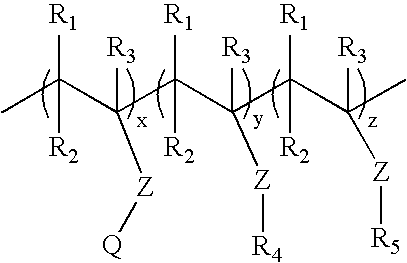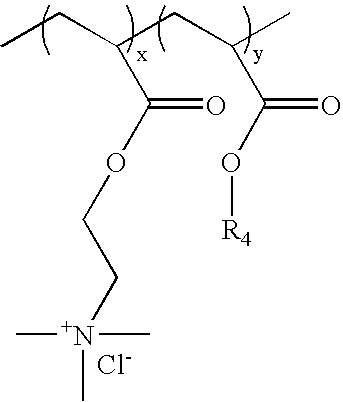Ion triggerable, cationic polymers, a method of making same and items using same
- Summary
- Abstract
- Description
- Claims
- Application Information
AI Technical Summary
Benefits of technology
Problems solved by technology
Method used
Image
Examples
example 1
Cationic Polymer Synthesis
[0142]Cationic acrylate polymers were synthesized in Methanol, Ethanol or a 75 / 25 Acetone / Water mixture at 30%-40% total monomer solids. Vazo-52 (DuPont) was utilized as a free-radical initiator. A typical laboratory procedure is described below.
[0143]Acetone (VWR, Westchester, Pa.) 399 g and deionized (DI) water, 125 g, were charged into a 3 L four-neck round bottom flask. The flask was cooled in an ice bath and bubbled with nitrogen for 20 minutes to eliminate oxygen. The reaction flask was heated to reflux (approximately 60° C.) prior to adding the monomer feeds and kept under nitrogen during reaction. ADAMQUAT MC-80 (Atofina Chemicals, Philadelphia, Pa.), 39.6 g, was diluted with 42.0 g of DI water and bubbled with nitrogen as it was fed into the reaction flask. Methyl acrylate (Atofina Chemicals, Philadelphia, Pa.), 267.7 g, and Vazo-52, 0.6 g, were dissolved in 126.1 g of acetone. This solution was cooled in an ice bath and bubbled with nitrogen as it...
example 2
Polymer Synthesis
[0144]Polymers were synthesized by batch or semi-batch reactions as previously described in Example 1.
[0145]Two different basesheet materials were used to evaluate binder performance: UCTAD tissue and thermally-bonded air-laid nonwoven.
UCTAD Tissue
[0146]An uncreped through-air dried tissue substrate with a basis weight of approximately 33 gsm was used to evaluate binder samples at 15%-30% add-on. The UCTAD basesheet had no residual wet-strength in water. A uniform and consistent amount of each binder was applied to the substrate via a pressurized spray unit. This handsheet spray unit is designed to closely resemble the operation of a commercial airlaid machine using liquid or emulsion binders, but on a much smaller scale. The equipment is enclosed in a small-framed housing, which can be placed, under a laboratory hood. The unit has a stationary sample holder (10″×13″) in the center of the unit and a moveable spray header directly over the sample ho...
example 3
[0174]Two binders provide comparative examples for the binder of the present invention. The first binder is a 75 / 25 (w / w) mixture of an ion-sensitive, sulfonate anion modified acrylic acid copolymer (SSB) disclosed in U.S. Pat. No. 6,423,801 B1 (incorporated herein by reference) and a non-crosslinking ethylene-vinyl acetate latex, DUR-O-SET®-RB, manufactured by National Starch and Chemical Co. of Bridgewater N.J. This binder package, designated “SSB / RB” in the following discussion, is disclosed in U.S. Pat. No. 6,429,261 B1 (incorporated herein by reference). It functions as an ion sensitive, triggerable binder for air-laid and other substrates, but suffers from a number of disadvantages compared to the present invention. These include: higher Tg (leading to higher dry basesheet stiffness) and low wettability or fluid absorption; higher sheet tackiness in the wet state, and poor pH control for the wetted product.
[0175]The second binder, DUR-O-SET® Elite-22, is a soft, self-crosslink...
PUM
| Property | Measurement | Unit |
|---|---|---|
| Fraction | aaaaa | aaaaa |
| Fraction | aaaaa | aaaaa |
| Fraction | aaaaa | aaaaa |
Abstract
Description
Claims
Application Information
 Login to View More
Login to View More - R&D
- Intellectual Property
- Life Sciences
- Materials
- Tech Scout
- Unparalleled Data Quality
- Higher Quality Content
- 60% Fewer Hallucinations
Browse by: Latest US Patents, China's latest patents, Technical Efficacy Thesaurus, Application Domain, Technology Topic, Popular Technical Reports.
© 2025 PatSnap. All rights reserved.Legal|Privacy policy|Modern Slavery Act Transparency Statement|Sitemap|About US| Contact US: help@patsnap.com



